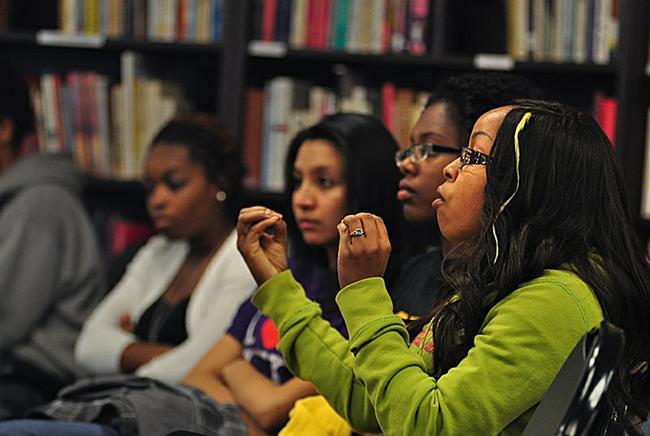The Women’s Center hosted “Women of Color: A Discussion” on Tuesday for participants to talk about their experiences on campus.
“Women of color is an inclusive term,” said junior Ashley Carpenter, who hosted the discussion. “Women of color can be African-American, Hispanic American or Asian-American. Tonight’s event is meant to be an open inclusive discussion. You don’t have to be a woman of color or a woman to attend.”
At the event, participants answered open-ended questions about issues relevant to their experiences at MU as women of color. Students talked about tokenization, feelings of isolation, hate-crime experiences and cultural stereotypes.
“My race is a very important factor of who I am, just from my day to day experiences,” Carpenter said. “Sometimes I’m the only black person in the class. For example, when a professor is taking attendance, he or she might, if it’s an ethnic name, assume it’s mine, just because of how I look. A lot of times I feel tokenized. I feel like I have to be the spokesperson for women of color and for my race, when really, we all have different viewpoints as individuals.”
Senior Aver Yakubu said she agrees that there are situations where race and gender are factors, but she doesn’t let them impact her level of success.
“There are situations where it is a factor,” Yakubu said. “I can be in a class of 150 and there may only be five African-American women. I wonder if the way I’m treated is impacted by those two features of who I am, but I’ve also been given good opportunities that are attributable to my being an African-American woman. Above all, I don’t let my race or sex hinder level of achievement.”
Sophomore Laura Herrera said that though she’s not sure she identifies as a woman of color, being a woman of Hispanic heritage has affected her experiences.
“I’m from Miami, which is very diverse, so I was nervous coming here because I didn’t know what it felt like to be in the minority,” she said. “In some instances, here I have (fewer) people to relate to, like when I want to speak in Spanish.”
Herrera said she has never had any serious negative experiences, but she has heard of incidents of intolerance.
“One of my friends told me how she was walking through Lowry mall speaking in Spanish to her mother on the phone,” she said. “A girl stopped in front of her and told her, ‘This is America. Speak English.’ I was shocked.”
Both Carpenter and Herrera said that organizations for minority groups like Mizzou Black Women’s Initiative and Hispanic American Leadership Organization make them feel more comfortable on campus. Carpenter said she thinks the climate at MU is fairly inclusive for women of color. However, Herrera said she is torn.
“I’m a big part of the social justice community so I kind of live in a bubble,” she said. “Our school is trying very hard to make campus more unified, but there are some who make our school look bad by committing hateful acts like those in the last two years.”
Carpenter, Yakabu and Herrera all said they can only speak from their individual experiences, but that race and gender do have an impact.
“Everyone has a different experience,” Herrera said. “I try to get to know people as individuals. Coming to events like Tuesday’s are good for that. People need to learn about each other.”








